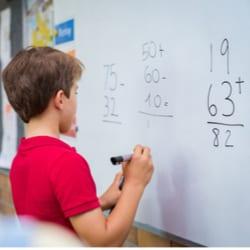Key elements of Questioning
- Plan questions in advance for probing, extending, revising and reflecting
- Teachers use open questions
- Questions used as an immediate source of feedback to track progress/understanding
- Cold call and strategic sampling are commonly used questioning strategies
Effective educators regularly use questioning as an interactive means to engage and challenge learners, and use it as a tool to check learner understanding and evaluate the effectiveness of their teaching.
What would happen if?
Questioning in a numeracy environment recognises and values the learning process and promotes opportunities to learn by stimulating exploration, curiosity, reasoning, and clarification of prior knowledge.
Questioning that models “not knowing is not failure” supports learners to engage in, clarify, justify, and reflect on their learning.
Effective questioning informs numeracy educators of the effectiveness of the strategies they have selected and acknowledges authentic learning.
Carefully planned questions encourage children’s provocative thinking and reasoning.
The types of questions a teacher utilises depends upon the learning goal, and fall into one of these categories:
- finding out and clarifying
- scaffolding understanding
- encouraging generalisations
- specialising and exemplifying
- altering and verifying.



